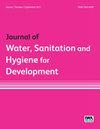Women, technology, and water: creating new waterscapes and contesting cultural norms
IF 1.4
4区 环境科学与生态学
Q3 WATER RESOURCES
Journal of Water Sanitation and Hygiene for Development
Pub Date : 2022-12-30
DOI:10.2166/washdev.2022.306
引用次数: 0
Abstract
With the analysis of primary data, the paper looks at how the adoption of new modes of water technologies and subsequent water commercialization has created new waterscapes. Water commercialization is changing cultural norms associated with water collection in the drought-prone villages of western Rajasthan. The newly introduced water tankers have selectively benefited the upper caste rich households who now buy water from the tankers at doorsteps. The majority of the poor and low caste households remain dependent on common water sources that are drying up due to neglect with the advent of water commercialization. Women from low caste poor households have to walk for long distances to fetch water in addition to doing physical labor to support family income. Though domestic water use remains a domain of woman's working space, men from high caste rich households have started fetching and storing water as it entails cash transactions.妇女、技术和水:创造新的水景和挑战文化规范
通过对原始数据的分析,本文着眼于采用新的水技术模式和随后的水商业化如何创造新的水景。在拉贾斯坦邦西部干旱频发的村庄,水的商业化正在改变与水收集相关的文化规范。新引入的水罐车有选择地让上层种姓的富裕家庭受益,他们现在在家门口从水罐车上买水。大多数贫困和低种姓家庭仍然依赖普通水源,而随着水商业化的到来,由于被忽视,这些水源正在枯竭。来自低种姓贫困家庭的妇女除了从事体力劳动以维持家庭收入外,还必须走很远的路取水。尽管家庭用水仍然是女性工作空间的一个领域,但来自高种姓富裕家庭的男性已经开始取水和蓄水,因为这需要现金交易。
本文章由计算机程序翻译,如有差异,请以英文原文为准。
求助全文
约1分钟内获得全文
求助全文
来源期刊

Journal of Water Sanitation and Hygiene for Development
WATER RESOURCES-
CiteScore
3.10
自引率
11.80%
发文量
58
审稿时长
16 weeks
期刊介绍:
The Journal of Water, Sanitation and Hygiene for Development is a peer-reviewed journal devoted to the dissemination of high-quality information on the science, policy and practice of drinking-water supply, sanitation and hygiene at local, national and international levels.
 求助内容:
求助内容: 应助结果提醒方式:
应助结果提醒方式:


